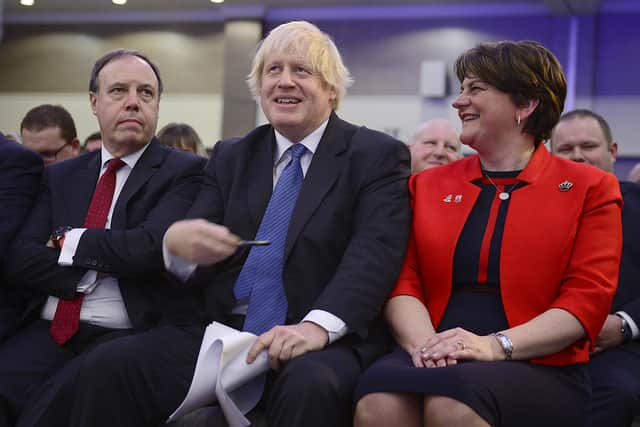Alex Kane: Unionists must understand UK priorities to avoid ‘betrayal’


The ‘it’ he meant was Boris Johnson’s ‘betrayal’ of unionism and Irish Sea border. Mind you, he could have meant ‘lousy unionists’ in general, a description he applied to Churchill and Thatcher, as well as Johnson. Unionists have had decades of having to ‘make the best’ of lousy unionists in Westminster: indeed, almost every PM since Edward Heath, who prorogued Stormont in 1972, has been accused of one form of betrayal or another.
It isn’t just London-based unionists who are routinely accused of betrayal. Ian Paisley had regular outbursts about O’Neill, Chichester-Clark, West, Faulkner, Molyneaux (calling him Judas Iscariot), Trimble and Empey. Paisley was later unceremoniously dumped by the DUP when it thought his relationship with Martin McGuinness (Chuckle Brothers) would see a flood of votes to Jim Allister’s newly formed TUV.
Advertisement
Hide AdAdvertisement
Hide AdRight now, in response to Johnson’s NI Protocol, the TUV, UUP, PUP and elements of loyalism are criticising the DUP for having got it so wrong with Johnson. Some in the DUP, unwilling to concede they were stupid to place all their eggs in a basket held by Johnson and the ERG, are now blaming the UUP for having supported the Good Friday Agreement in 1998. Hmmm. That would be the same agreement the DUP claimed to have improved and then implemented with Sinn Fein since May 2007, wouldn’t it?


After Johnson addressed the DUP conference in 2018 – when he promised to stop anything which would push NI into some sort of semi-colonial status – I spoke to one of the party’s most senior players: “Do you really trust Johnson? Do you not even entertain the possibility he and the ERG will let you down?” His answer was brutal: “The DUP is not the rollover UUP, Alex. We are not the puppets in this relationship. We won’t be letting May, Johnson or anyone else dictate the terms.”
Yet Boris Johnson did betray the DUP. He promised them one thing and then did the opposite. He lied to the DUP’s inner core of leadership and negotiators. He came to a pre-election event in Northern Ireland last November and told the audience – mostly local Conservatives, bless them – to tear up and place in the bin any letters they might receive about any new border. In later interviews he continued to dismiss claims he was prepared to support any policy which might be construed as ‘undermining or weakening’ NI’s constitutional position.
And therein lies the real problem for unionism. What Johnson did wasn’t unique. Like so many prime ministers before him – most of whom claimed to be supporters of the geographical/constitutional integrity of the UK – he prioritised other interests over the interests of NI unionism. So, bearing in mind that he is merely the latest in a long line to follow the same course, what conclusion should unionists here reach? The immediate one, obviously, is that prime ministers and their parties don’t give a stuff about NI: because they have no emotional attachment to it.
Advertisement
Hide AdAdvertisement
Hide AdIf that is the case, then it raises all sorts of other questions and problems. If you don’t have an emotional attachment to something then why hold onto it if it is, as seems to be the view of many MPs down the years, more trouble than it is worth? Yet, why would successive UK governments, particularly during the years when the IRA was armed and active (1969-1997), seem so determined to find a way of placating SF rather than crushing armed republicanism?
Why did successive UK governments invest more time and energy in building a working relationship with successive Irish governments? Why did successive UK governments – after the 1998 referendum – conclude so many below-the-radar, nod-and-wink side deals and arrangements which would have required IRA Army Council approval (and we know that the council still acts in an overarching capacity)? Why did the May/Johnson governments – both propped up by the DUP – seem to think it of greater necessity to reassure the Irish government than the DUP or broader unionism?
Why is the DUP now reduced to the absurdity of pretending – and it really is a pretence – Johnson’s betrayal doesn’t actually amount to a hill of beans? Why does it continue with the pretence it can find ways to mitigate the impact of an arrangement which has the imprimatur of the EU, Johnson’s government and a whopping parliamentary majority? Why does it still trot out the line it can all be sorted by a vote in the Assembly in four years’ time?
I’m not overwhelmingly convinced successive UK governments have been actively determined to disengage from Northern Ireland. That said, nor am I convinced they would shed any tears if a majority voted to leave in a border poll. The task for unionism – and I’ve said this many times – is to read and fully understand the intentions and end purpose of UK policy since Stormont’s prorogation in 1972.
Advertisement
Hide AdAdvertisement
Hide AdIt seems to me there are two continuing priorities: a) an absence of terrorist campaigns – a huge drain on resources; and b) an arm’s length relationship in which NI remains in the UK but doesn’t require too much oversight or present too many problems.
The task for unionism, in NI’s centenary year, is to bear that in mind and find a strategy and narrative which understands and accommodates the UK’s long term priorities for here.
——— ———
A message from the Editor:
Thank you for reading this story on our website. While I have your attention, I also have an important request to make of you.
With the coronavirus lockdown having a major impact on many of our advertisers — and consequently the revenue we receive — we are more reliant than ever on you taking out a digital subscription.
Advertisement
Hide AdAdvertisement
Hide AdSubscribe to newsletter.co.uk and enjoy unlimited access to the best Northern Ireland and UK news and information online and on our app. With a digital subscription, you can read more than 5 articles, see fewer ads, enjoy faster load times, and get access to exclusive newsletters and content. Visit https://www.newsletter.co.uk/subscriptions now to sign up.
Our journalism costs money and we rely on advertising, print and digital revenues to help to support them. By supporting us, we are able to support you in providing trusted, fact-checked content for this website.
Alistair Bushe
Editor